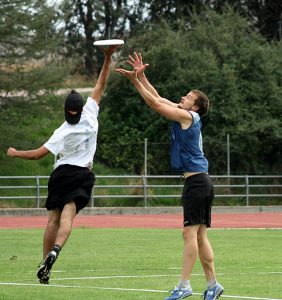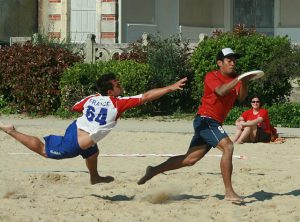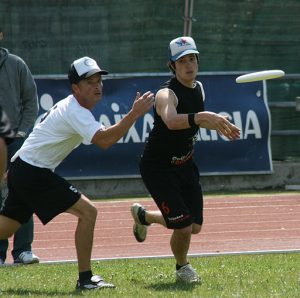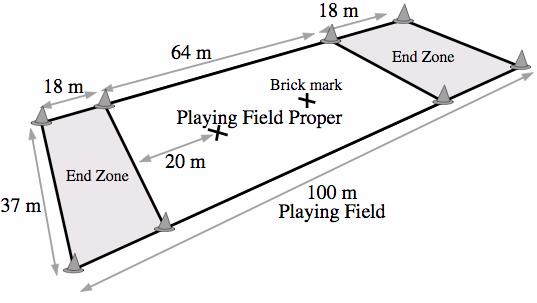 Ultimate is a team sport which mixes elements of football, basketball and rugby, substituting the ball with a flying disc (Frisbee) and the referee with spirit of the game. It’s the most popular sport among those played with a flying disc.
Ultimate is a team sport which mixes elements of football, basketball and rugby, substituting the ball with a flying disc (Frisbee) and the referee with spirit of the game. It’s the most popular sport among those played with a flying disc.
Invented and popularized in high schools and universities in the United States in the ’60s, Ultimate came to Europe in the early ’80s. The first team in Spain appeared in the mid-’90s and now there are nearly 25 teams and more than 500 players in the country.
Two characteristics of Ultimate which make it unique are:
- Spirit of the Game: every player is expected to compete at their highest level, without compromising fair play or sportsmanship. While seemingly counterproductive, the lack of referees actually helps to reinforce this ideal.
- Coed teams: one of the most popular categories in Ultimate is the Coed or mixed división. This means that teams must have both guys and girls on the field at the same time (4-3 on grass, 3-2 on beach).
The sport
Ultimate is played with a disc on a grass field or on a beach field. The field is similar to a rugby or American football field, and the objective is to score points by receiving the disc in these end zones by passing it among the players on a team (a player with the disc must remain stationary). If the disc touches the ground or is intercepted, possession switches to the other team who then has an opportunity to score by passing the disc into their end zone. The size of the field depends on the surface, with the beach field being slightly smaller than the grass field. This is to accommodate the typical 7 vs 7 playing style of grass, while beach is usually 5 vs 5.
Ultimate in 10 simple rules
 The playing field: Rectangular (64 meters by 36 meters), with an end zone at each end (18 meters each). That is, 100 meters total.
The playing field: Rectangular (64 meters by 36 meters), with an end zone at each end (18 meters each). That is, 100 meters total.- Starting play: The teams have 7 players on the field plus subs. Each point starts with the teams on the line at the front of their end zone. The defending team throws the disc (called the pull) to the attacking team to being play.
- Scoring: Each time the attacking team receives the disc in the end zone of the defending team, they score a point. After scoring a point, the next point begins with the attacking team becoming the defenders.
- Disc movement: The disc can move in any direction via passes between players of the attacking team. The player with the disc must be stationary (i.e., running with the disc is prohibited). The player with the disc (the thrower) has 10 seconds to attempt a pass to another player on their team. The player defending the thrower (called the marker) counts the seconds out loud.
- Turnovers: When a pass is incomplete (e.g., the disc goes out of bounds, the receiving player drops the disc, the defense blocks or intercepts the pass), the defending team gains possession of the disc and becomes the attacking team.
- Substitutions: Substitutions can only be made after scoring a point, or if a player is injured during a point.
 Contact: The sport is considered non-contact. If there is contact between two players, the result is a foul. Picks and other obstructions are also prohibited by the rules.
Contact: The sport is considered non-contact. If there is contact between two players, the result is a foul. Picks and other obstructions are also prohibited by the rules.- Fouls: When there’s contact between players, the result is a foul. If the foul causes a turnover, the attacking team remains in possession of the disc and play is restarted. If the players involved in the foul can’t come to an agreement about the foul, the disc is returned to the previous thrower and play is restarted.
- Refereeing: Each player is responsible for calling his or her own fouls and for resolving any disputes that might arise. Even at the highest level of Ultimate, there is no official referee.
- Spirit of the Game: Ultimate emphasizes sportsmanship and fair play. Competitive play is encouraged, but never at the expense of the respect between players, observation of the rules or the enjoyment of playing the sport.







